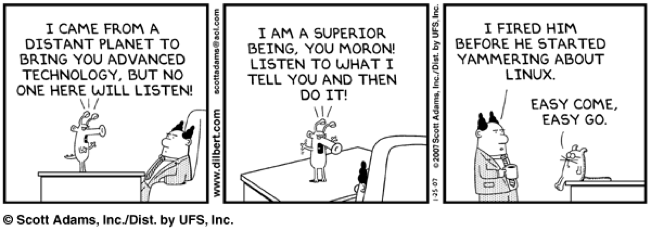More about Open Source Software and Linux

In light of the upcoming Ontario Linux Fest, I decided to use this blog entry to reflect on Open Source Software and Linux.
Free Software and the Free Software Foundation (FSF) were pioneered by the famous Richard Stallman. Free Software does not mean “at no monetary cost”……..it means that the source code is free to anyone who wants to use it (source code freedom). In the words of Stallman, think “free” as in “freedom”, not “free” as in “free beer”.
There are four freedoms that the FSF advocates:
- 0 - The freedom to run the program, for any purpose.
- 1 - The freedom to study how the program works, and adapt it to your needs.
- 2 - The freedom to redistribute copies so you can help your neighbor.
- 3 - The freedom to improve the program, and release your improvements to the public, so that the whole community benefits.
Freedom 1 and 3 require access to the source code of the software, so this software is commonly called Open Source Software (OSS) today. The FSF wanted to make an Open Source operating system called GNU, and nearly all parts were completed by the early 1990s except for the kernel. That is where Linus Torvalds jumped in with his Open Source Linux kernel, creating the GNU/Linux operating system. Linux has since taken high-end computing by storm and is probably the most powerful and extensible operating system today.
I have always been an advocate Richard Stallman’s vision, the FSF, GNU and OSS. However, it wasn’t until 2003 when I fully understood the implications of it.
I am often asked to give presentations or write articles on Linux, so I was not surprised when I was invited to talk at a private meeting at Microsoft Canada about Linux in April 2003. The meeting room was rather large and there were about 15 people around an oval table with there eyes focused on me. During the introductions, I noticed that the sales people were all on the left side of the table, and that the managers/developers were all on the right (the two camps did not converse together during the meeting).
After my short presentation about what I do and what Linux/OSS is, there was an open question period. The developers had no questions - they played with their pens as if they hated being forced to attend these meetings (I can relate :-). However, the sales/marketing people bombarded me with questions about how many companies are using certain Linux programs and development environments such as Java. They were a strange bunch - they seemed impatient and agitated, with dramatic outbursts that are typically reserved for the House of Commons.
One marketing lady was particularly upset with how I thought that Open Source software was beneficial for the entire computing industry and that all software should eventually become Open Source. She flailed her arms and said, “So how are we supposed to make money? Without selling software, we will all be out of jobs and no one would make any software!”
I paused for a moment and replied, “Open Source is not about putting people out of jobs, it is about keeping the information in our society freely available so that people can develop software using what others have done before them. Today, we spend billions of dollars on finding the cure for cancer. We don’t think about the millions of nurses, administrators, doctors and hospital staff that will be out of a job when cancer is finally cured…..because these people will not be out of a job - they will adapt into new roles and continue to make the world a better place. Software companies will always exist even if proprietary software is made extinct by Open Source software. These companies will continue to make software, only this software will be Open Source software. They will continue to make money from it by charging for it (distribution, development, support, documentation), but they will not hide their source code with copyrights to hinder others from competing with them. Thus, the software company of the future will be rewarded based on its ability to create software that adapts to industry’s need.”
After my answer, this particular lady quickly asked another unrelated question as if my answer was unimportant. I got the feeling that I was talking to a brick wall. I also realized that these sales/marketing people (and most who work in the proprietary software industry) only possess a single perspective on what software is and how it works to shape our society.
After reading “Free Software Free Society” by Richard Stallman, I think this is because “Software publishers have worked long and hard to convince people that there is only one way to look at the issue.” Richard is quick to point out that software publishers assume that they have a natural right to own software and thus have power over their users (copyright is not a natural right in the legal system). Moreover, software publishers assume that the functions/features of software are what make it valuable (who cares if the code can be reused?), and that without proprietary software companies, we would have no software at all. And of course, they think that software piracy hurts every aspect of software development and is a crime against a company’s natural rights.
Simply put, software runs our planet. Open Source Software and Linux are about freedom of speech. They are about keeping software open so that others can improve the software of today and take us into the future.
I am interested in your views on Open Source Software - send me an email at jason.eckert@trios.com and tell me your experiences, thoughts and opinions.